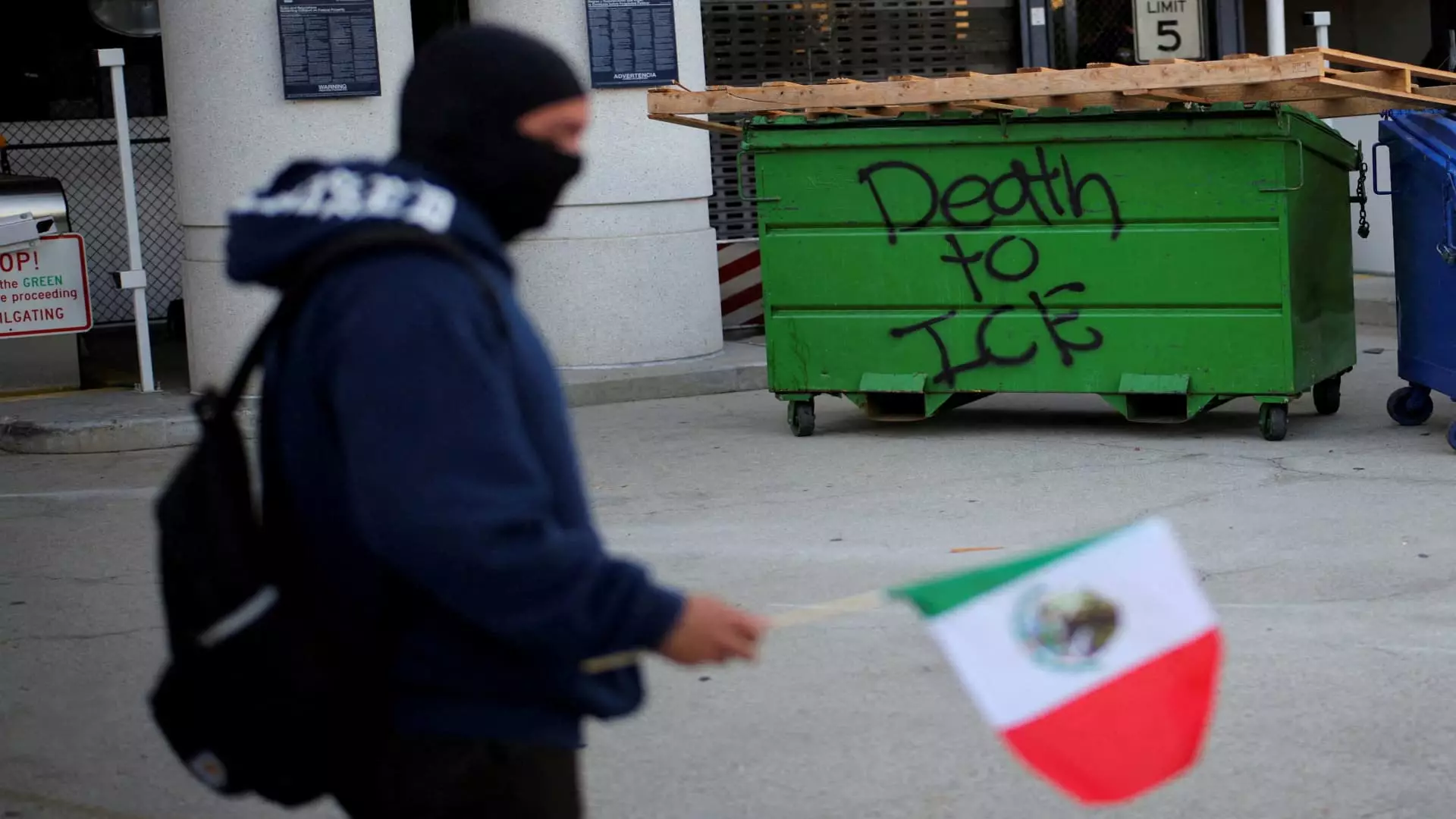In recent days, an electrifying confrontation between federal agents and demonstrators in Los Angeles raised critical questions about immigration policy and federal authority. What transpired during these protests is more than a simple clash between opposing viewpoints—it highlights a broader debate about the moral implications of current immigration tactics and the unyielding stance of a government seemingly disconnected from the people it claims to protect. This situation encapsulates the growing unrest brewing within communities that feel under siege by federal initiatives masquerading as public safety measures.
Voices of Resistance
In Southeast Los Angeles, thousands gathered for a protest to voice their disgust over Immigration and Customs Enforcement (ICE) raids that had taken place just a day prior, leading to over 44 arrests. The demonstrators—many waving Mexican flags and donning masks symbolizing their solidarity—animatedly represented a heterogeneous community bound together by shared histories and dreams. This wasn’t just a political protest; it was a desperate cry for humanity in the face of relentless federal immigration enforcement efforts. Amidst claims made by senior White House aide Stephen Miller labeling the protests as an “insurrection,” one can’t help but wonder who the real insurrectionists are. Are they the ones crying out for their rights in the street, or the bureaucratic enforcers executing draconian policies against vulnerable populations?
The Biden Administration’s Dilemma
While the rhetoric surrounding immigration policy often pivots on national security and law enforcement, the reality is filled with human stories that disrupt the simplistic narratives of “us versus them.” Liberal Democrats in cities such as Los Angeles face the daunting challenge of managing a diverse constituency that, according to census data, is significantly Hispanic and foreign-born. This population does not merely desire legal status; they seek recognition, dignity, and the assurance that their lives matter in the eyes of a government that too often relegates them to statistics on a spreadsheet.
Los Angeles Mayor Karen Bass boldly condemned the immigration raids, describing them as tactics that “sow terror” within communities, warning that such actions disrupt public safety. Her sentiments resonate widely across progressive circles, but the question remains: How can politicians effectively counterbalance enforcement with compassion? Furthermore, where is the dialogue for immigration reform that honors the complexity and contributions of immigrant communities?
Federal Response and Division
The Department of Homeland Security (DHS) issued fiery statements that seemed to amplify divisions rather than bridge gaps, accusing local leaders like Mayor Bass of stoking violence and undermining law enforcement. Such rhetoric does nothing but heighten tensions and foster an atmosphere of fear. The irony lies in accusing “sanctuary politicians” of inciting chaos while simultaneously rolling out highly militarized and aggressive enforcement tactics. The label of “insurrection” levied against demonstrators serves only to portray protestors as criminals, while ignoring their fight for justice and equal rights.
As federal agents reign supreme, often equipped with military-grade technology, the essential question reverberates: At what point does the enforcement of laws become a violation of human rights? With a reported focus on arresting 3,000 undocumented migrants daily, the pursuit of a “secure border” transforms into an alarming quest that risks tearing apart families and communities, employing a language of war over one of humanity.
The Struggle for Justice
Increasingly, we witness narratives shifting from “the needs of the many outweigh the needs of the few” to something that resembles “the needs of the few dictate the lives of the many.” As political discourse continues to polarize, the voices from the streets echo with urgency. Protestors are affirming their right to exist and flourish within a society that often marginalizes them. They are not insurrections; they are movements, open invitations for dialogue, and challenges to power structures that too often ignore their humanity.
Thus, the core of the controversy surrounding immigration raids in Los Angeles prompts a vital reflection on how we perceive laws and human rights. We live in times where the rhetoric of law enforcement must show compassion in order to serve both justice and the community’s moral fabric. When civic unrest emerges in the face of federal policies, it reflects a deeper yearning for rectitude—a demand for a more equitable society that recognizes the profound, complex narratives of all its inhabitants. The tragic irony is that while the inertial forces of bureaucracy churn forward, they often lose sight of the lives impacted by their decisions, thereby denying the fundamental principles upon which the country was founded: liberty and justice for all.

Leave a Reply